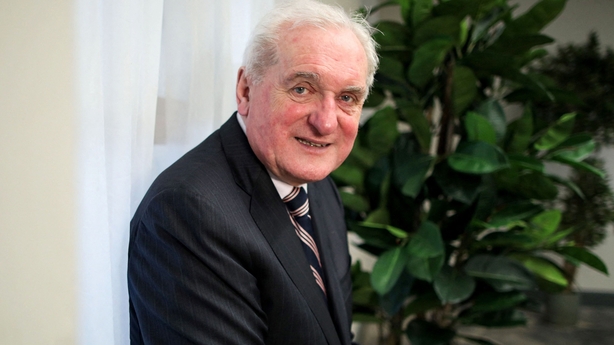Former Taoiseach Bertie Ahern has told a conference marking 50 years of Ireland in the EU that although Europe is growing, Ireland should do what it can to keep its sovereignty and have an independent line on issues.
The conference 'Ireland and the EU at 50' was held at Maynooth University.
It examined the high and low points of Ireland in the EU.
Professor John O'Brennan from the Centre of European and Eurasian Studies at Maynooth University, spoke about the progression Ireland has made as a member of the EU.
Mr O’Brennan said: "I think looking back over those 50 years, we can say that the country has been really transformed by membership".
"When we entered the European Community in 1973, we were the poorest of the then nine member states. Now we're amongst the richest of the 27 member states," he said.
"So, there's clearly something important that's happened over those 50 years," he added.
"We think the European Union is an important part of the kind of transformations that happened in Irish society, in Irish politics and crucially in the economy," he said.
Mr O’Brennan described the single market as "really beneficial for Ireland".
"A lot of the studies that have been done demonstrate that Ireland has been one of the big winners from the single market over the last 30 years and it's enabled us to bring in all of that lucrative foreign direct investment from the United States and elsewhere," he asserted.
However, there have been low points and Professor O'Brennan said the financial crash and the two failed referenda were among them.
"I would say the low point was definitely after 2008, the financial crisis. It caused immense tensions between Dublin and Brussels," he said.
"The way in which the EU authorities handled it, I think was seen as very unwelcome by a lot of Irish people. And I think they're right about that," he added.
Discussing the referenda Mr O'Brennan stated: "You could also look at the two failed referendums in 2001 and 2008. But I think any fair-minded person has to look at the 50 years in the round. You look at the benefits, you look at the costs".
"We've been the recipients of more than €40 billion net in payments from the EU since 1973," he said.
"And if you add in all the benefits accruing from being at the core of the single market, I think the balance sheet is a very positive one in Ireland's favour," he added.
The conference heard from two former Taoisigh John Bruton and Bertie Ahern.

Mr Ahern said while Europe is growing Ireland should do what it can to keep its sovereignty.
"We had under a million people working and now there are two and a half million people working," he said.
"The standard of living, the quality of life has to improve. The standards that we have for everything from health and safety, the environment, water policy. So many of these things have been improved because of our membership," Mr Ahern said.
"During our 50 years of membership there have been problems along the way, ups and downs, but any fair analysis that has to be done has been overwhelmingly positive," said the former Taoiseach.
Looking ahead to the future, Mr Ahern accepted there are challenges.
"We have to make our own allegiances within Europe, but I don't think we should go with a particular group. I think we should continue making sure we have as many friends as we can in Europe, and we have of course to deal with the UK in a different relationship," he stated.
"There are a lot of challenges ahead and we are a small country so naturally, we have to take the European Union line on most things, but we should try and evolve ourselves as best we can. In a way that keeps as much of our sovereignty as we can," he said.
"We've pooled that in Europe, but that doesn't stop us having an independent line on a lot of issues," he added.
Director General of the Institute of International and European Affairs, Alex White, told the conference that the 50-year milestone provided the opportunity to reflect and look towards the future.
"What's the potential for the European Union? What do the citizens of Europe look to the European Union to do? For example, we've come out of a pandemic, which was a really serious threat to public health and life, could the European Union have more to say and more to do and more involvement in health policy, you'd have to amend the treaties, that would require another referendum," Mr White said.
"This as much about the future as it about the past," he said.
"It's all about the EU being relevant to the citizens of the member states, that's really the big challenge," he added.







